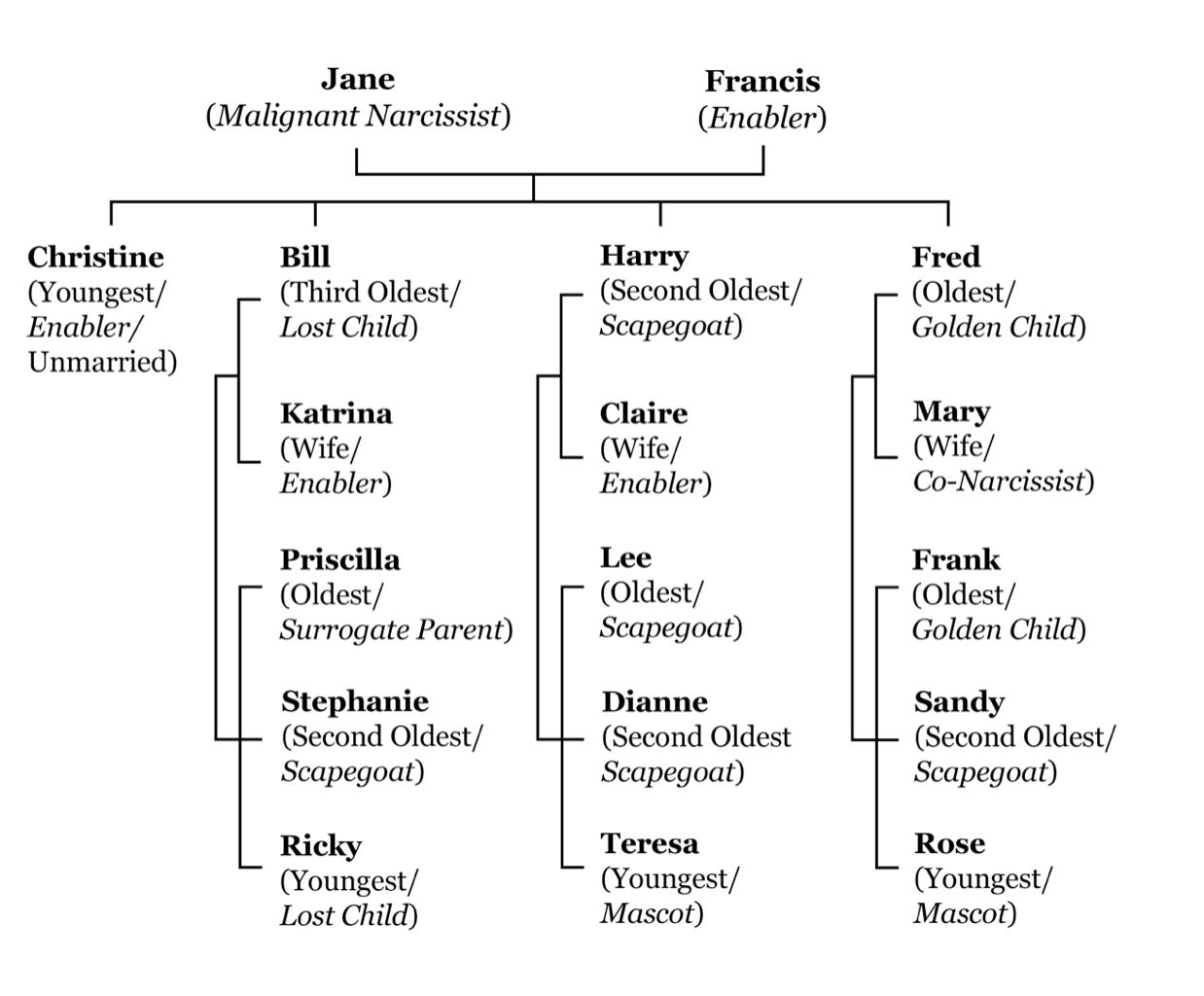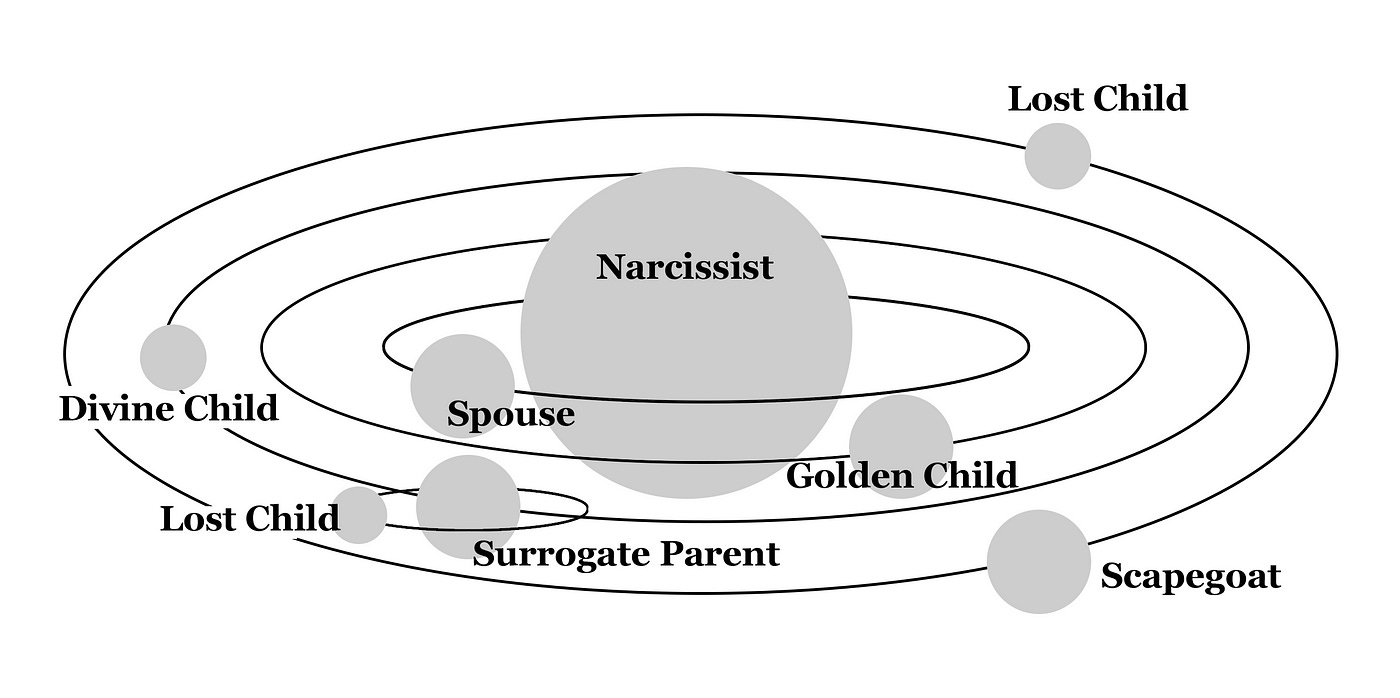If you have not read up on the narcissistic family yet, my article detailing the roles and dynamics can be found here. I recommend you check it out before moving on to this article.
Family creates the strongest of bonds. As we grow, our family shapes us physically, spiritually and psychologically. We take on its customs, rituals and beliefs about the world. It is not only a group to which we belong, but an ideology which we inherit.
When you consider a family tree, you can see how one person’s belief system can trickle down and affect dozens and eventually hundreds of people through each generation. Usually, a child internalises a great deal from their family, but as they separate and actualise, they grow in unpredictable ways, and the influence of the family is diluted by the child’s experiences outside the home.
In the narcissistic family, the development of the child is much more tightly controlled, which means the influence of the family becomes more potent and absolute. The most frightening thing about the narcissistic family is that through this tendency toward isolation and gaslighting, one person’s delusional agenda can rain down over generations like a dark shadow, without anybody realising it.
Consider the following family tree:
Bold: Parents (Head narcissist and spouse)
Italic: First generation (Children of narcissist)
Normal: Second generation (Grand-children of narcissist)
Jane is a malignant narcissist with a strong, controlling personality. Francisis a mild-mannered man with a dry sense of humour. Together they have four children; Fred, Harry, Bill and Christine. Because it is headed by a narcissist, their family takes on the structure of a typical narcissistic family, which is organised as follows:
Fred (Golden Child), who is the oldest, has a superiority complex, championed by his mother as the leader of the family. Fred respects his father but believes himself to be the strongest and wisest in the family.
Harry (Scapegoat) is the ‘angry one’ who receives the bulk of his mother’s and family’s criticism and ridicule. Harry resents Fred’s overpowering personality and bossiness, and they often fight.
Bill (Lost Child), who is the third oldest, does what he is told by his mother and tries to stay out of the way.
Christine (Divine Child) is the youngest and does her best to make her mother happy, helping around the house and looking after her brothers, but she still receives a lot of criticism from her mother, who sees Christine as a threat.
Jane is consistently disapproving of and strict with her children and does not believe in affection. She herself grew up in a tense, loveless and often violent family, and her children have become the targets of her repressed anger. The three boys tend to act out their suppressed rage by misbehaving, at home and in public, but Jane eventually gets a hold of them and pulls them back into line with a yelling.
As difficult as they can sometimes be, the children all worship their parents and maintain the belief that their family is a happy one. For Fred, Harry, Billand Christine, the family is their only priority, and their mother Jane is the ultimate authority on what direction their life takes.
Family Politics
As Jane and Francis’ children grow up, they eventually have their own families. Having been raised in a hostile and authoritarian environment, and having not had their needs met, each person develops narcissistic traits to compensate. They maintain the belief that their family is both superior to others and a happy one. Meanwhile, they project their grandiose false self and repressed rage at their respective families, infecting their spouse and children and keeping them trapped in a brutal competition for love and acceptance.
As Fred, Harry and Bill have more children with their wives, the narcissistic structure expands into an intergenerational narcissistic family, and a stand-off ensues. Each branch of the family tree begins competing with the other. Each family inherits a collective identity, based on that of the parent which leads it.
Fred’s family assumes superiority due to the brute strength of Fred’spersonality and his self-assigned position as ‘leader’ of the entire family.
Harry’s family become the collective scapegoat, ridiculed and attacked by all the others, and they come to resent Fred’s family.
Bill’s family remain on the outside as a collective lost family, unable to assert themselves due to Bill being intimidated by his older brother Fred. When Fred is around, Bill tends to go into his shell, and his family subconsciously knows not to rock the boat.
As the family tree continues to grow, the show becomes bigger and more elaborate. Frank, Fred’s son, assumes the role of the golden child of his immediate family as well as the extended family, due to him internalising his father’s grandiose personality and him being the oldest of his generation.
Lee, Harry’s son, has become the scapegoat of his family as well as the extended family, playing second fiddle to Frank while internalising his father’s rage and inheriting his father’s identity as the ‘angry one’.
Priscilla, Bill’s oldest daughter, plays surrogate parent to her siblings. She is studious and keeps out of the limelight. She prefers not to arouse her father’s rage, which he represses due to not being able to express it, and which rains down on her randomly.
Sandy, Dianne and Stephanie, the second oldest daughters of Fred, Harry and Billrespectively, have all had difficult upbringings. Being the second oldest and female, they are scapegoated. Sandy ran away from home numerous times and has developed a drug habit. She has borderline personality disorder and suffers from schizophrenic episodes. Dianne tends to fantasise and dissociate a lot and developed bipolar disorder in her twenties. Stephanie is the subject of constant ridicule from her siblings and also twice attempted to run away from home. The family avoids discussing the acting out and emotional turmoil of the second-born daughters, and the blame is placed squarely on the girls when they do act out. Nobody questions the cause of these patterns.
The far-reaching consequences of narcissism are on display in this family tree. Jane’sgrandiose and domineering personality creates a competition between her children and pushes the shame down the family tree toward Harry and Bill. Narcissism evolves between the siblings, each of them desperate to avoid the hot potato of shame. They carry their false self with them into their respective families, repeating the same dynamics and handing the hot potato to their spouse and children. Narcissistic supply gets pushed up the family tree and funnelled through Fred, the golden child, and up to Jane. Shame then gets pushed down and distributed in varying amounts between the rest of the family, mostly collecting with the scapegoats and lost children.
Each family gossips about the other in secret. The oldest and most outspoken assume their positions of power while the remaining family members try not to rock the boat. Individuality is discouraged and ridiculed, except in the case of Fred’s children. Homophobia and racism run rampant, and the senior family members disapprove of any behaviour which does not fit their family model.
Family ‘closeness’ is celebrated, and a competition for bragging rights plays out at any possible chance, among each other and in public. Behind this cross-generational narcissism lies the grandiose false self of Jane, who sits atop the family tree as a matriarch, commanding respect and submission from all of her children and grandchildren. Jane does not hesitate to bark orders, and due to her seniority, the family rarely challenges her. Jane’snarcissistic strength lies in having a large family to orbit around her, submit to her will, and provide her with a steady stream of narcissistic supply. Her doctrine of obedience and family sacrifice is enforced with an iron fist, leaving no space for individual expression or the pursuance of an individual lifestyle.
A Narcissistic Mentality
Who develops strong narcissistic tendencies, who becomes a malignant narcissist, and who remains within the healthy range depends on numerous factors, which include birth order, attachment style and personality type. Regardless of the role, however, every member of a narcissistic family is complicit in the dysfunction. To live in a narcissistic family is to have a narcissistic mentality.
The narcissistic mentality, unconsciously absorbed, is the belief that relationships are defined by power hierarchies, and that you are either in charge, infantilised or, worst case, you are scapegoated or forgotten. Those are the only options: you are either worthy or worthless, strong or weak, either a hero or a villain. There is no in-between, you are committed to the narcissistic family doctrine through a rigid role, or you are out. As long as you remain inside the intergenerational narcissistic family, you must continuously fight to fend off the overwhelming sense of shame which hovers over you.
Browse more of my articles:
Narcissistic Relationships | Knowing The Narcissist | Abuse Recovery | The Narcissistic Family| Exploring Narcissism | Borderline & Histrionic
Check out my Books on Narcissistic Abuse. You can also Buy Me A Coffee to support my writing.







Quite literally the roadmap to intergenerational trauma. How do we break it? Therapy. Recovery. Education. And perhaps marrying someone who does not have this family dynamic and can open your eyes to how sick it is. Although, this choice creates its own set of problems (I married into an NPD family -it's hell on your marriage). This is such a good breakdown of how these dysfunctional patterns get passed own. Thank you!
It’s good to have this dynamic spelled out as it shows how pervasive it is. How to process and move on?